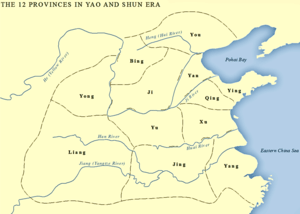Twelve Provinces
The Twelve Provinces is a term used in ancient Chinese histories to refer to territorial divisions during the reigns of the mythological emperors Yao and Shun of the Three Sovereigns and Five Emperors.
| Twelve Provinces | |||||||
|---|---|---|---|---|---|---|---|
| Chinese | 十二州 | ||||||
| |||||||

Records in histories
The "Annals of the Five Emperors" (五帝本紀) section of Records of the Grand Historian mentioned:
Shun felt that the land north of Ji Province was too wide, so he created Bing Province; Yan and Qi were too vast and distant, so he formed You Province out of Yan, and Ying Province out of Qi, hence there were the Twelve Provinces. [1]
Volume 85 of the Book of Han recorded that in 30 BC Gu Yong (谷永) mentioned:
There was a great flood in Yao's time, the land was divided into the Twelve Provinces...
Yan Shigu of the Tang dynasty wrote this annotation in volume 85 of the Book of Han:
The Twelve Provinces were Ji, Yan, Yu, Qing, Xu, Jing, Yang, Yong, Liang, You, Bing, and Ying (營).
See also
- Nine Provinces
- Eighteen Provinces
References
- (舜以冀州之北廣大,分置并州;燕、齊遼遠,分燕置幽州,分齊為營州,於是為十二州。) Sima Qian. Records of the Grand Historian, Volume 1, Annals of the Five Emperors.
- (堯遭洪水之災,天下分絕為十二州……) Ban Gu et al. Book of Han, Volume 85, Biographies of Gu Yong and Du Ye.
- (十二州謂兾、兗、豫、青、徐、荊、揚、雍、梁、幽、並、營也。) Ban Gu et al. Book of Han, Volume 85, Biographies of Gu Yong and Du Ye (including annotations by Yan Shigu).